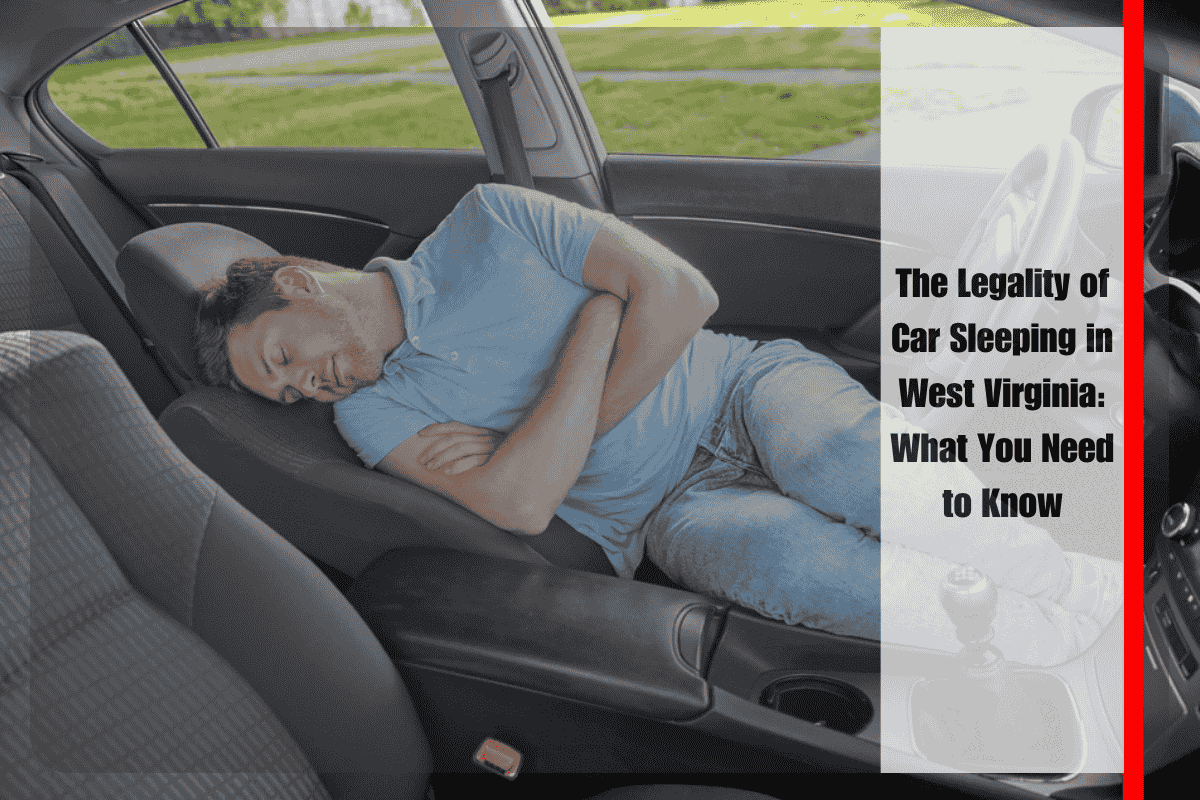Sleeping in your car can sometimes feel like a practical option, whether you’re on a road trip, need a quick nap during a long drive, or are facing a temporary housing issue. However, not all states and cities are equally welcoming to the idea of sleeping in your car, and the rules can vary widely depending on local laws. In West Virginia, there are specific regulations that affect whether you can legally sleep in your car. This article will explore the legality of car sleeping in West Virginia, what you need to know about local ordinances, and tips for staying safe and avoiding trouble if you find yourself needing to rest in your vehicle.
West Virginia’s Laws on Sleeping in Your Car
In general, West Virginia does not have a statewide law prohibiting sleeping in your car. However, local laws in cities and towns across the state may vary, and certain areas may have specific regulations regarding overnight parking or camping. The legality often depends on where you choose to park your car and the circumstances surrounding your stay.
While West Virginia doesn’t impose blanket bans on car sleeping, it’s important to be aware of the following factors when considering resting in your vehicle.
Local Ordinances and Restrictions
Although West Virginia does not have statewide laws banning car sleeping, local municipalities often have their own rules. For example, many cities and towns have ordinances that prohibit overnight parking in certain areas, particularly in commercial districts, residential neighborhoods, or public parking lots. These laws are primarily designed to prevent people from camping or using public spaces as long-term resting spots.
In larger cities like Charleston or Morgantown, you may find stricter enforcement of parking regulations. It’s always a good idea to check local rules or city ordinances before deciding to sleep in your car. Some local governments may even set up designated areas where people can park overnight legally, especially if you’re in a more rural area.
Parking Lots and Private Property
One of the most important things to keep in mind when considering car sleeping is whether you are parked on private property or public property. If you are parked in a private lot, you need the owner’s permission. For example, if you sleep in your car at a shopping center or a restaurant parking lot, you could be violating the property owner’s rules. Property owners have the right to ask you to leave or even call law enforcement to remove you from the premises.
For public parking lots, like those at rest stops or designated overnight parking areas, you may be able to sleep in your car as long as you’re abiding by the specific parking regulations. Some rest areas may allow overnight parking, especially for long-distance drivers, but it’s important to double-check whether there are any restrictions on how long you can park.
Safety and Risks
While sleeping in your car may be legal in certain areas of West Virginia, it’s essential to consider safety concerns. Being in a car overnight, especially in unfamiliar areas, can expose you to risks like theft, vandalism, or even personal harm. Always try to park in well-lit, public areas, such as designated rest areas, truck stops, or other places known for being safe for overnight stops.
Additionally, make sure that you do not block entrances, exits, or traffic flow when parking for the night. Parking violations, such as blocking fire lanes or spaces reserved for certain uses, could result in fines or the vehicle being towed.
The Importance of Respecting Local Laws
Even if there’s no explicit law against sleeping in your car in West Virginia, respecting local rules and being mindful of the area you’re parked in is key. Many cities, especially those that attract tourists or have large student populations, are used to dealing with transient people sleeping in their cars. As such, it’s crucial to remain respectful of the community and avoid overstaying your welcome in any particular location.
If you’re in a rural area, it may be easier to find a quiet, secluded spot to rest, but it’s always wise to verify that you’re not trespassing or violating any local codes. It’s also a good practice to contact local authorities in advance if you’re unsure about the parking regulations in an area.
Alternatives to Sleeping in Your Car
If you find that car sleeping is not permitted or you’re concerned about the legality or safety of resting in your vehicle, there are alternative options available. Many cities have affordable motels, campgrounds, or RV parks that offer overnight parking and sleeping arrangements. Some businesses or large retail chains, like Walmart, may allow overnight parking for RVs or vehicles, though you should always ask for permission before doing so.
In addition, some non-profit organizations or churches offer temporary housing for those in need. If you’re in West Virginia and facing a difficult situation, resources may be available to provide a safe place to sleep.
Sleeping in your car in West Virginia is not outright illegal, but it does depend on the location and local regulations. It’s important to be aware of parking laws, property rights, and safety considerations before deciding to rest in your vehicle. Always check for local ordinances or restrictions in the area where you plan to sleep and be respectful of the community you are in. If car sleeping is not allowed, consider alternative options like campgrounds, motels, or other designated overnight parking spaces. Being informed about the laws and staying safe will ensure that you don’t run into any legal trouble or face unnecessary risks.
Sources
[1] https://www.boondockersbible.com/learn/west-virginia-rest-area-rules/
[2] https://teamjustice.com/is-it-illegal-to-sleep-in-your-car/
[3] https://www.jackery.com/blogs/knowledge/is-it-illegal-to-sleep-in-your-car-what-states
[4] https://www.lawinfo.com/resources/criminal-defense/is-it-illegal-to-sleep-in-your-car.html
[5] https://www.westvirginiaduilawyers.com/can-i-get-a-dui-in-west-virginia-for-sleeping-in-my-car/












